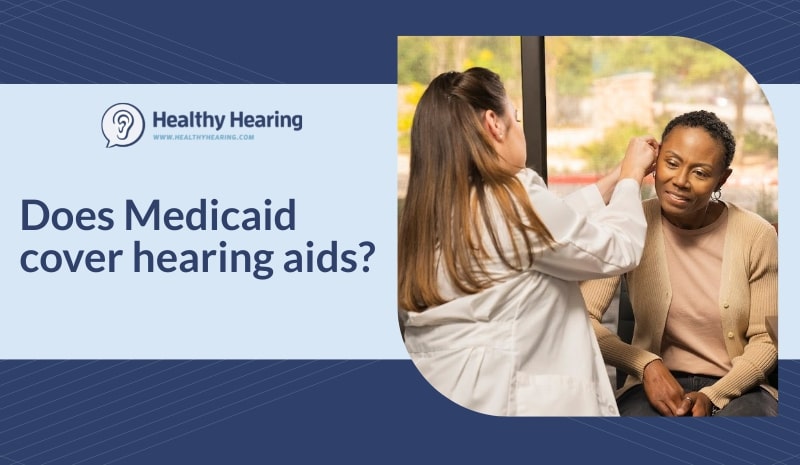|
www.HealthyHearing.com |
Can I use Medicaid for hearing aids?What this government program offers—and what it does not—for people who need hearing aids
Contributed by Madeleine Burry Key points:
If you have hearing loss and need hearing aids, you know they’re not exactly optional. Without hearing aids, you’re cut off from communications, making it hard to maintain relationships and manage day-to-day tasks (like completing in-person transactions or making phone calls). That’s more than an inconvenience: hearing aids have other benefits—like possibly delaying dementia and reducing falls—beyond helping you hear. And yet, the sticker price for hearing aids can be shocking: On average, they cost between $2,000 and $7,000 a pair. Hearing exams are covered by Medicare for older adults. However, hearing aids are not covered, despite age-related hearing loss being quite common. But, depending on where you live, if you’re eligible for Medicaid, coverage for hearing aids may be available.
What is Medicaid?Medicaid is a health care option for people who have a low income level or have certain disabilities, providing coverage to millions of people in America. Here’s what is unique about this program: While the federal government sets the requirements, it’s administered by states. That means that Medicaid coverage if you live in Alabama is not the same as if you live in Illinois. Benefits depend largely on what state you live inThat’s true for the hearing coverage available through Medicaid, too. “The coverage for hearing aids under Medicaid can vary depending on the state's specific program,” says insurance professional Evan Tunis, president at Florida Healthcare Insurance. In some states, you’ll have comprehensive benefits that include hearing coverage, while in others it’s more restrictive, he says. What Medicaid may cover when it comes to hearingMany hearing-related services may be covered by Medicaid, Tunis says, including:
But again: This coverage varies by state. (Except for children, who are covered throughout the country with EPSDT.) “It is important to check with your state's Medicaid program to determine what services are covered and if you qualify for them,” Tunis says. To find out coverage in your state, you can visit your state’s Medicaid website. Or, for an at-a-glance look, the HLAA offers a summary of state Medicaid hearing-related benefits. Even with states that do offer hearing aid coverage through Medicaid, the requirements and parameters may feel perplexing. For instance, in Florida, there’s coverage for cochlear implants in one ear, not both. Several states specify the amount of hearing loss required for hearing aid coverage. Nebraska’s Medicaid program offers coverage for standard in-the-ear, behind the ear, or body hearing aids, but not for in-the-canal (ITC) or completely in the canal (CIC) hearing aids. (Learn more about the various types of hearing aids available.) “In some cases, Medicaid may even provide coverage for digital hearing aids that can help enhance sound quality and reduce background noise,” Tunis says. But, there may be limitations on the brands or types of hearing aids covered, he says. “Some states have a list of approved devices that are eligible for coverage, while others may allow for more flexibility in choosing a hearing aid.” How to find a hearing provider who takes MedicaidYou’ll also need to make sure to visit a hearing specialist—whether that’s an audiologist, hearing instrument specialist, or ENT—who accepts Medicaid. It may take some legwork. There are a few ways to find someone:
Options if you aren’t covered“If you are not covered by Medicaid and cannot afford the cost of hearing aids, there may be other options available to help with the financial burden,” Tunis says. Consider asking about payment plans or financing options that may be available from the hearing aid manufacturer, Tunis says. Sometimes clinics have payment plans available too. “There are organizations and programs that provide assistance for individuals who need hearing aids but cannot afford them,” Tunis says. And, if you’re in certain demographics — a government employee, military veteran, or member of an American Indian or Alaska Native community, there may be free or reduced cost options available, per the National Council on Aging. In depth: Insurance coverage and financial assistance for hearing aids Madeleine Burry
|
Featured clinics near me
Hearing Health Solutions from Ohio ENT - Columbus
974 Bethel Rd Ste B
Columbus, OH 43214
Earzlink Hearing Care - Reynoldsburg
7668 Slate Ridge Blvd
Reynoldsburg, OH 43068

Find a clinic
We have more hearing clinic reviews than any other site!



 Madeleine Burry is a Brooklyn-based freelance writer and editor. She's written about health for several online publications, including Women's Health, Prevention, Health, Livestrong and Good Housekeeping. You can follow her on Twitter @lovelanewest.
Madeleine Burry is a Brooklyn-based freelance writer and editor. She's written about health for several online publications, including Women's Health, Prevention, Health, Livestrong and Good Housekeeping. You can follow her on Twitter @lovelanewest.